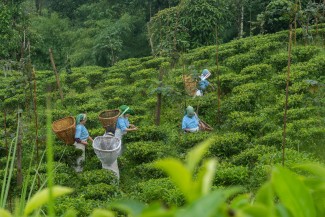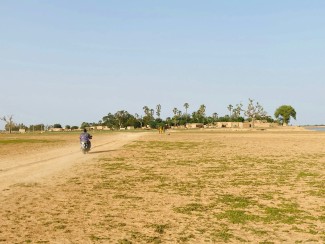The story of pineapple cultivation in Benin is a centuries-long one. But its role in the formal, global trade in pineapple is a bit shorter.
Yet the country is now Africa’s fourth largest pineapple exporter, and its trade of the fruit with the European Union (EU) increased by almost six times between 2000 and 2014, reaching between 400,000 and 500,000 tons a year. But in 2017 there was a major hitch when the government instituted a voluntary ban on exports to the EU because of high pesticide levels found in its fruit.
The Benin government spent eight months resolving the use of the chemical, which farmers had been using to turn their naturally green pineapples the yellow color preferred by European consumers. Today, the government is continuing to work to improve the sector, which along with cashew and cotton is considered the trifecta of growth potential there.
“The pineapple value chain, with women almost 80% of the active players, is a primary source of employment, export income, raw materials for industry and food for the local population,” said Euloge Agbakou Houngbo, who works on Benin’s trade development as the National Implementation Unit Coordinator for the Enhanced Integrated Framework (EIF).
Because pineapple is a “non-traditional” agricultural item, there is a lot of potential for local development and profits as the sector continues to evolve.
VARIETY
Benin’s tropical climate offers ideal growing conditions for high quality pineapple. But as a largely rural, developing country, getting carefully tended fruit to buyers outside its borders is complicated.
Of the many things to address: increase yields, improve post-harvest handling, fix transportation issues, develop processed pineapple products, ensure standards compliance, build cold storage facilities, market pineapple varieties.
“Benin’s pineapples are in high demand in the sub-region, including Nigeria, Niger, Burkina Faso, Morocco. But of the current annual production, only 1% of the volume produced is exported to Europe. We have these issues of quality, standards and especially air cargo transport,” Houngbo said.
CULTIVATION
The two most popular species of pineapple cultivated in Benin are Cayenne and Sugarloaf. And it takes more than one year to grow them. With about two-thirds of the population residing in rural areas and farming for subsistence or to sell locally, moving into pineapple growing is a big step.
Most pineapples are grown in the country’s south, in Atlantique, where transport to the capital and out to other countries for export takes time. One aim for the development of the sector is to move into processing the fruits into juice or dried snacks, but that requires coordination between farmers and businesses, and the proper facilities.
“Benin has more than 70 small enterprises involved in the transformation of pineapple into juice, dried pineapple and other derivatives. For pineapple juice, the pioneers are Fruits Tillou and Promo-Fruit, but they work at only half capacity,” said Houngbo.
This is due to a shortage of raw materials, he added. Resolving the infrastructure and transport issues would help the two companies, which export mostly to the Nigerian market.
CULTIVATION
The two most popular species of pineapple cultivated in Benin are Cayenne and Sugarloaf. And it takes more than one year to grow them. With about two-thirds of the population residing in rural areas and farming for subsistence or to sell locally, moving into pineapple growing is a big step.
Most pineapples are grown in the country’s south, in Atlantique, where transport to the capital and out to other countries for export takes time. One aim for the development of the sector is to move into processing the fruits into juice or dried snacks, but that requires coordination between farmers and businesses, and the proper facilities.
“Benin has more than 70 small enterprises involved in the transformation of pineapple into juice, dried pineapple and other derivatives. For pineapple juice, the pioneers are Fruits Tillou and Promo-Fruit, but they work at only half capacity,” said Houngbo.
This is due to a shortage of raw materials, he added. Resolving the infrastructure and transport issues would help the two companies, which export mostly to the Nigerian market.
If you would like to reuse any material published here, please let us know by sending an email to EIF Communications: eifcommunications@wto.org.



